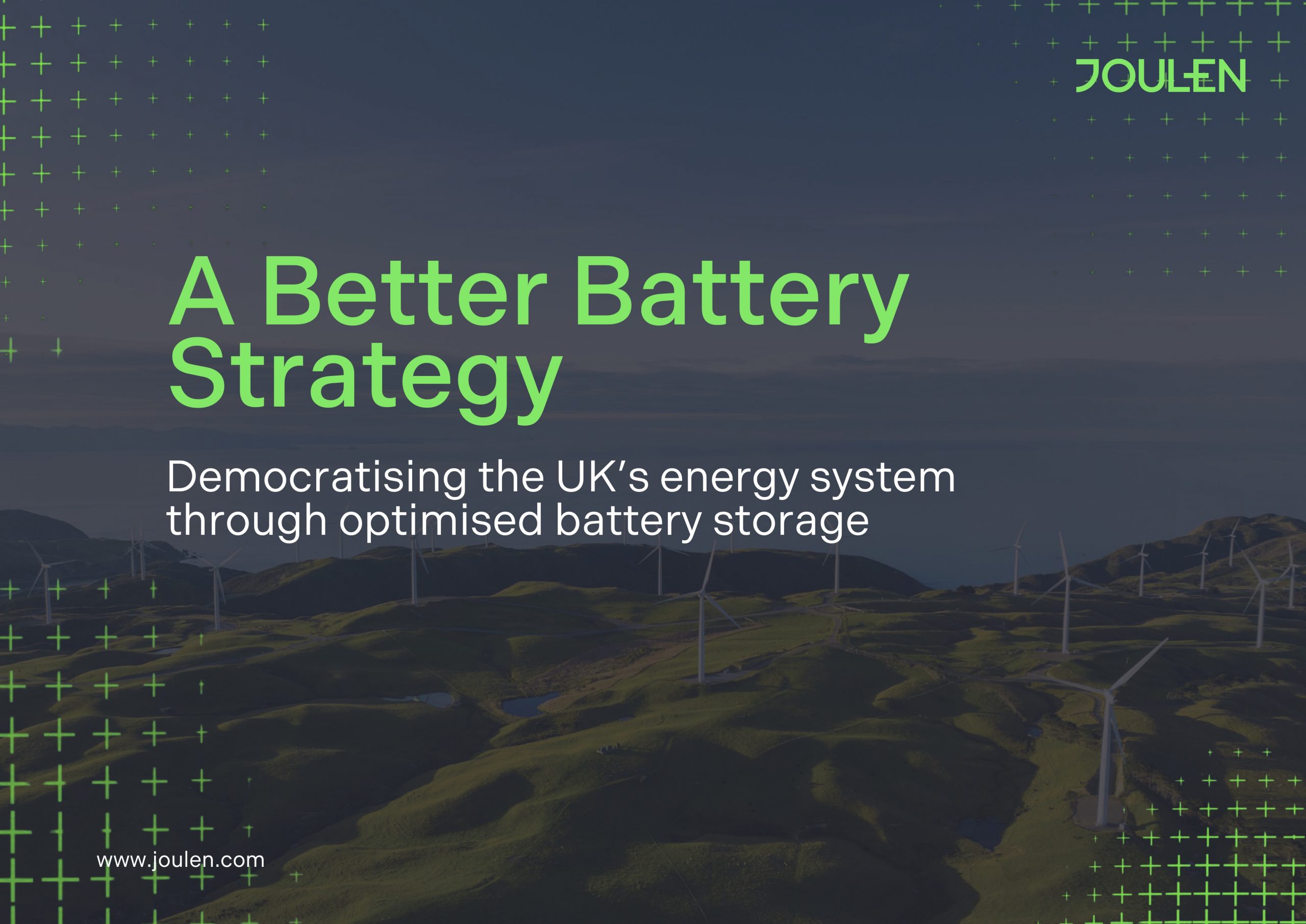Joulen, a leader in energy optimisation services, today publishes its Better Battery Strategy, with new data showing how better use of small-scale renewable energy and storage systems could be earning UK businesses £75,000 and households £375 of additional income every year, bringing down household bills by 65%. Joulen is calling on the Government to democratise our energy market, through optimisation, incentives, and market reform, to bring down energy bills, stabilise the grid, and deliver a clean energy system.
As we switch to intermittent renewable energy sources to meet the Government’s 2030 clean energy target, battery storage will play an essential role. National Grid has stated that 50GW of storage is needed in the UK by 2050, with this technology stabilising the grid, matching electricity demand minute by minute, and balancing a clean, reliable energy system.
Joulen’s new report identified four steps that must be taken by the new Government in order to democratise our energy system, boost the income of small businesses and households, and ensure a just and equitable transition;
- Bring batteries into existing plans, from its Rooftop Revolution to the Warm Homes Plan.
- Enable easier access for all batteries – namely domestic and C&I (commercial and industrial) systems – to take part in all markets via Virtual Power Plant (VPP) technology.
- Incentivise battery investment and broader market participation, via tax incentives and increased returns through better use of data.
- Ensure optimisation is at the heart of all deployment to ensure no unit of clean energy is wasted.
Chris Doherty, Managing Director at Joulen, said, “Batteries are an essential technology in the decarbonisation of the grid. By not allowing every battery to participate in the market and not directing existing renewable capacity in the most efficient way, clean energy and the investment behind it is being wasted. Our data shows that, with optimised small-scale battery and renewable systems on business premises and households in every corner of the UK, we can get closer, sooner, to a clean energy system.
“By maximising the value of every one of these batteries through data, we can spread the benefits to small businesses and households, bringing down costs and optimising our grid in the process. The Government must implement a Better Battery Strategy now, to democratise and secure our clean energy future.”
Bringing down bills
Small businesses and households across the UK are facing a cost-of-living crisis. The average household electricity bill has risen exponentially, with bills expected to rise by 9% to £1,714 a year for the typical household.
Joulen’s modelling, which analysed over 70 data sets and scenarios, revealed that businesses with onsite systems – from retailers to manufacturers – could be making savings of up to 60% each year on their energy bills with optimised Solar PV and battery storage, with additional earnings of £75,000 per battery every year through access to energy markets, maximising earnings from their investment and assets.
It also showed that consumers with battery-fitted solar panels could be saving up to 65% on bills, making an additional income of £375 per year through easier access to energy markets, per household, based on average household energy consumption.
As a market designed to get grid-scale projects online, the UK is currently limiting access to energy markets, restricting the paybacks to investors and developers. By utilising Virtual Power Plant technology (VPP), which integrates multiple power sources to provide grid services, the UK can allow households and businesses to participate in our energy market, reducing bills, incentivising further uptake, and ensuring everyone can benefit.
The backbone of the energy transition
To achieve our clean energy target by 2030, battery storage capacity will need to increase to around 50GW by 2050. However, with grid-scale batteries getting connection dates well beyond 2030, these timeframes are misaligned. Smaller systems, which take just 12 months to build, are essential in achieving net zero goals.
Joulen’s modelling shows that if just five per cent of the UK’s 5.6m private sector businesses installed and optimised renewable and storage systems, they could each save more than 207Kg of carbon dioxide equivalent (CO2e) per day. This scales up to 21,000,000 tonnes a year – equivalent to more than a billion fully-grown trees, or taking 45,000 petrol or diesel cars off the road by 2030.
The analysis also shows that if every one of the Government’s 1.5 million new homes had renewable and battery storage systems, we could save 1,320,000 tonnes of CO2 before 2030.
The analysis also shows that better utilising smaller batteries could ease pressure on the grid, provide further storage capability locally, and help to avoid overbuilding and overspending on the energy transition. If 0.1% of UK businesses (6,900 businesses), invested in 1MW batteries with local on-site renewable generation this could be the equivalent of more power than Hinkley Point C, as well as 130 standard grid-scale battery sites. Homes with renewable and storage systems could also reduce their reliance on the grid, easing network constraints and reducing our reliance on imported gas.
To successfully position the UK as a clean energy superpower, Joulen’s report calls on the Government to follow its four clear steps: put batteries on the agenda; allow all batteries to take part in all markets; incentivise investment; and ensure optimisation is at the heart of the energy transition.
Joulen’s Better Battery Strategy was modelled on 70 proprietary data sets and scenarios, taking into account optimisation opportunities, existing and possible market mechanisms, and public data sources.




